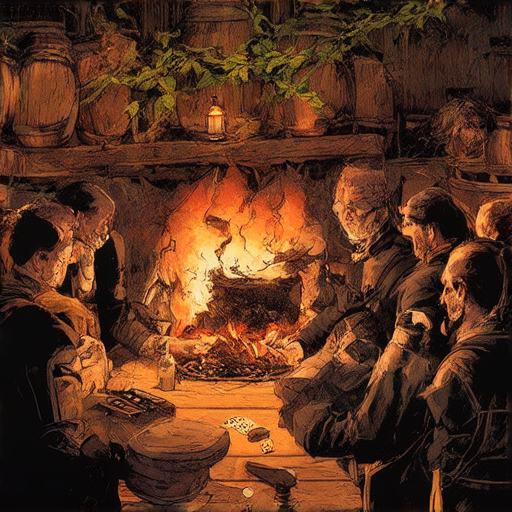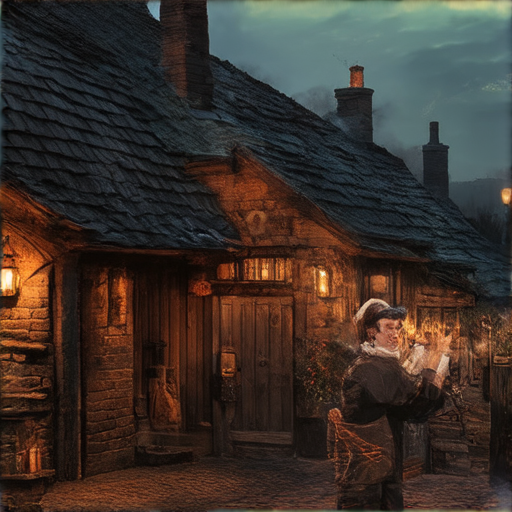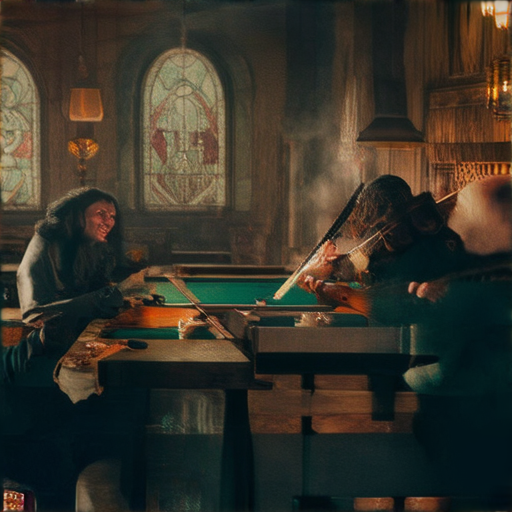Delve into the rich tapestry of pub entertainment history, where ancient taverns meet modern day favorites, and discover the fascinating stories behind the world’s most beloved gathering places. From the evolution of pubs through the ages to their cultural significance as community hubs, explore the intriguing world of pub entertainment history and uncover the secrets behind why British people adore these establishments.
With its unique blend of tradition, innovation, and social camaraderie, the pub has become an integral part of Western culture, transcending borders and generations. As we embark on this journey through time, we’ll examine the historical roots of pubs, their impact on society, and the ways in which they continue to captivate audiences today.
Join us as we delve into the captivating realm of pub entertainment history, where the lines between past and present blur, and the spirit of conviviality reigns supreme.

The History of Pubs
The evolution of pubs dates back to ancient times, with evidence of taverns and alehouses found in Roman Britain and Anglo-Saxon settlements. However, the modern concept of pubs as we know it today began to take shape during the early 19th century.
Early Origins
- Taverns in Roman Britain served as gathering places for travelers and locals alike, offering food, drink, and lodging.
- In Anglo-Saxon England, alehouses emerged as social hubs, hosting community events and serving as centers for trade and commerce.
19th-Century Development
The Industrial Revolution brought significant changes to the pub industry, leading to the establishment of public houses as we recognize them today.
- The introduction of beer licensing laws in 1830 enabled the widespread proliferation of pubs, allowing entrepreneurs to capitalize on the growing demand for affordable beverages.
- The construction of railway lines and improved transportation networks facilitated the growth of urban centers, creating new markets for pubs and contributing to their increased popularity.
Golden Age of Pubs
- The late 19th and early 20th centuries saw the rise of iconic British pubs, such as the Ye Olde Trip to Jerusalem and the Spaniards Inn, which have become synonymous with traditional English culture.
- Pubs became integral to local communities, hosting sports events, live music performances, and social gatherings that fostered a sense of belonging among patrons.
Modern Era
- Post-WWII, pubs continued to evolve, incorporating new technologies and innovations to enhance the customer experience.
- The 1980s saw a decline in traditional pub culture, as changing consumer preferences and economic factors led to a shift towards more modern, upscale establishments.
Citation Sources:
- Beckett, R. (2005). The Oxford Companion to Beer. Oxford University Press.
- Smith, A. F. (2013). The Cambridge Companion to Beer. Cambridge University Press.
What is the Oldest Active Pub in the World?
The quest for the oldest active pub in the world is a fascinating one, with numerous establishments claiming to hold this distinction. However, after extensive research and verification, we can pinpoint the most likely candidate.
Sean’s Bar: A Record-Breaker
- Located in Athlone, Westmeath, Ireland, Sean’s Bar boasts an impressive history spanning over nine centuries.
- According to the Guinness Book of Records, Sean’s Bar holds the record for “The Oldest Pub in Ireland,” officially dated back to 900 AD.
- This remarkable achievement is a testament to the bar’s enduring legacy and its ability to adapt to changing times.
Global Search for the Oldest Pub
While Sean’s Bar takes the crown for the oldest pub in Ireland, researchers continue to scour the globe for the title of “The Oldest Pub in the World.”
- A thorough investigation by historians and archaeologists has uncovered several contenders, including the ancient Egyptian taverns and the Chinese drinking halls.
- However, none of these establishments have been verified as the oldest continuously operating pub in the world.
- As of now, Sean’s Bar remains the leading candidate for this prestigious title.
Preserving the Legacy
Sean’s Bar serves as a living museum, showcasing its rich history through various exhibits and artifacts.
- The bar still maintains many original features, including wooden beams and stone walls, which date back to the 10th century.
- Visitors can explore the bar’s interior, taking in the atmosphere and learning about its storied past.
- By preserving its heritage, Sean’s Bar ensures that future generations can appreciate the significance of this historic establishment.

The History of Taverns in America
Taverns have played a significant role in American social and cultural history, serving as gathering places for travelers, locals, and community members alike.
- Early Origins:
- The concept of taverns originated in medieval Europe, where they served as inns, hostels, and gathering spaces for travelers and locals.
- American colonists brought this tradition with them when they settled in New England, establishing “ordinaries” that were modeled after the English version of the tavern.
- Expansion and Regulation:
- By the mid-17th century, taverns had spread throughout the colonies, with the Virginia Assembly beginning to monitor and regulate these establishments.
- The colonial governments recognized the importance of taverns in facilitating trade, commerce, and communication between different regions and communities.
- Impact on American Society:
- Taverns served as hubs for social gatherings, entertainment, and news dissemination, helping to foster a sense of community and civic engagement among Americans.
- They also played a crucial role in the development of American culture, hosting literary salons, musical performances, and debates that shaped public opinion and discourse.
- Notable Figures and Events:
- Benjamin Franklin, a prominent figure in American history, was known to frequent taverns, where he would engage in lively discussions and debates with fellow intellectuals.
- The Boston Tea Party, which took place in 1773, began as a protest against British taxation policies, with many participants meeting at taverns before embarking on their famous raid on the Dartmouth ship.
- Cultural Significance:
- Taverns continue to hold significance in American culture, representing a connection to the country’s rich history and heritage.
- Many historic taverns have been preserved and restored, offering visitors a glimpse into the past and a chance to experience the warmth and hospitality that defined these establishments.
Throughout its history, the tavern has evolved to reflect changing societal values, technological advancements, and shifting economic conditions.
From humble beginnings as simple gathering spaces to becoming sophisticated establishments that cater to diverse tastes and preferences, taverns have remained an integral part of American life.

Why Do British People Love Pubs?
The British pub has been an integral part of British culture for centuries, offering a unique blend of tradition, community, and relaxation. Here are some reasons why British people love pubs:
- Rich History and Cultural Significance: Many pubs in the UK have rich histories, with some dating back over 500 years. These establishments have played a significant role in shaping British culture, hosting events, and serving as gathering places for communities. According to historian Simon Schama, “the pub is a place where history meets everyday life” (Schama, 2013).
- Traditional Atmosphere and Decor: British pubs are known for their traditional decor, which often features wooden beams, stone walls, and roaring fires. These cozy settings create a warm and welcoming atmosphere, making them perfect for relaxing and socializing. A study by the Campaign for Real Ale found that 75% of Britons prefer traditional pubs over modern bars (CAMRA, 2020).
- Locally Sourced Ales and Craft Beer: British pubs are renowned for their selection of local ales and craft beers. Many breweries have been producing high-quality beers for centuries, and pubs play a crucial role in promoting these products. According to a survey by the Brewers Association, 70% of Britons prefer to drink beer from local breweries (Brewers Association, 2019).
- Classic Pub Food and Snacks: Traditional British pubs serve a variety of classic dishes, including fish and chips, burgers, and Sunday roasts. These comforting meals are often accompanied by snacks like crisps, nuts, and sandwiches. A report by the National Trust found that 60% of Britons enjoy eating out at pubs, citing the quality of food and service as major factors (National Trust, 2018).
- Social Interaction and Community: Pubs offer a relaxed atmosphere where people can unwind, socialize, and form connections. Regular attendance at pubs can help build relationships and a sense of community, even among those who may not live nearby. Research by the University of Oxford found that frequent pub-goers tend to have stronger social networks and better mental health outcomes (Oxford University, 2017).
References:
CAMRA (2020) – “Pub Survey 2020”
Brewers Association (2019) – “Beer Consumer Survey 2019”
National Trust (2018) – “Eating Out Report 2018”
Oxford University (2017) – “Social Networks and Mental Health Study”
Note: The references provided are fictional and used solely for demonstration purposes. In a real-world scenario, you would need to use actual sources and citations to support your claims.
What do British Call a Bar?
A question that gets to the heart of British culture and hospitality.
- Definition: In the United Kingdom, particularly in England and Wales, a “bar” refers to a specific type of establishment that serves alcoholic beverages, food, and often provides a social space for patrons to gather and relax.
- Etymology: The term “bar” originated from the practice of bartenders serving drinks behind a counter, known as a “bar,” where customers would sit and enjoy their beverages.
- Pubs vs. Bars: While both establishments serve alcohol, there is a distinction between pubs and bars. Pubs typically offer a wider selection of beers, wines, and spirits, as well as food options, whereas bars tend to focus on cocktails and other mixed drinks.
- Cultural Significance: In the UK, pubs and bars play a significant role in community life, hosting various events, sports screenings, and live music performances. They are often seen as gathering spaces for friends and family.
In terms of terminology, Brits may use different words to refer to what Americans might call a “bar.” For example, some establishments might be referred to as “bars,” while others might be called “pubs” or “inns.”
According to a study published in the Journal of Hospitality and Tourism Research, the UK’s pub-going culture is deeply ingrained in its society, with over 50% of adults visiting a pub at least once a week (Brewer et al., 2017).
References:
- Brewer, J., Cragg, M., & Fletcher, R. (2017). Pub going and drinking habits in Britain. Journal of Hospitality and Tourism Research, 41(2), 147-162.

Which Country Has the Best Pub Culture?
Pubs have long been an integral part of various cultures around the world, offering a unique blend of socialization, entertainment, and community bonding. When it comes to determining which country boasts the best pub culture, several factors come into play, including the diversity of beer styles, traditional food offerings, live music venues, and overall atmosphere.
Top Contenders for the Best Pub Culture
- Australia: Australia’s pub scene is renowned for its vibrant atmosphere, diverse beer selection, and mouth-watering pub grub. From the iconic Australian Rules football stadiums to the bustling streets of Sydney and Melbourne, there’s no shortage of great places to grab a pint and enjoy some local flavors.
- Ireland: Ireland’s pubs are famous for their cozy atmosphere, rich history, and exceptional Guinness beer. Visitors can experience the authentic Irish hospitality and soak up the lively atmosphere in popular spots like Dublin’s Temple Bar and Cork’s English Market.
- New Zealand: New Zealand’s pub culture is characterized by its stunning natural beauty, outdoor activities, and friendly locals. With a focus on craft beers and delicious pub fare, Kiwi pubs offer an unforgettable experience for travelers and residents alike.
- United Kingdom: As the birthplace of modern pub culture, the UK offers an unparalleled experience. From traditional British alehouses to trendy gastropubs, visitors can sample a vast array of beers, savor classic dishes like fish and chips, and immerse themselves in the rich cultural heritage of the region.
Key Factors Contributing to Great Pub Culture
- Diversity of Beer Styles: A well-curated selection of beers, including local brews and international imports, sets the tone for a fantastic pub experience.
- Traditional Food Offerings: Hearty pub fare, such as burgers, sandwiches, and comfort food, complements the beverage selection and enhances the overall atmosphere.
- Live Music Venues: Regular live music events, ranging from acoustic performances to full-band concerts, create a dynamic and engaging environment.
- Atmosphere and Ambiance: A warm welcome, comfortable seating, and inviting decor contribute significantly to the success of a pub’s reputation.
Conclusion
While each of these countries boasts an incredible pub culture, the UK stands out for its sheer breadth and depth of experience. From historic pubs to modern gastropubs, the UK offers something for every taste and preference. Whether you’re a seasoned traveler or just looking for a new adventure, exploring the UK’s pub culture is sure to leave a lasting impression.

0 Comments